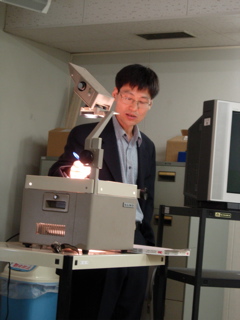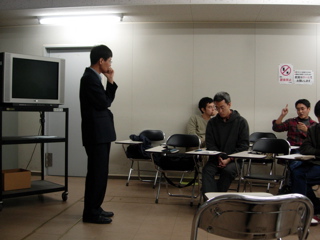October 29, 2004: Byeong-Uk Yi, Does Korean Have Count Nouns?
[Japanese | English]
- Time:
- 4:30pm, October 29, 2004
- Place:
- Room 101, 1st floor, Building 10, College of Arts and Sciences, University of Tokyo Komaba campus.
(Note room change.)
- Speaker:
- Byeong-Uk Yi, University of Minnesota
- Title:
- Does Korean Have Count Nouns?
- Abstract:
-
Some people say no to the question and hold that common nouns of
Korean and other East Asian languages (e.g., Japanese or Chinese) must
be closer to mass nouns of, e.g., English (e.g., "water" or "milk").
They hold this view on the basis of an analysis of expressions for
number and quantity in Korean and those other East Asian languages.
In the present talk, I shall argue against their analysis of Korean
expressions for number and quantity. By doing so, I aim to show that
common nouns of Korean are amenable to a distinction comparable to, if
not the same as, the distinction between count nouns and mass nouns
of, e.g., English. This, I think, helps to clarify the nature of the
mass vs. count noun distinction in Indo-European languages as well as
'peculiarities' of some Asian languages, and to differentiate the talk
of number (e.g., "three humans") from the talk of quantity (e.g.,
"three gallons of milk") and counting from measuring.


There will be a lecture by the same speaker at Keio University on
October 26. See the web page of the Center for Integrated Research on the Mind for information.
University of Tokyo Semantics Research Group
Sponsored by the Center for Evolutionary Cognitive Sciences at the University of Tokyo
Last modified: 2004-10-30 01:30:27 JST



